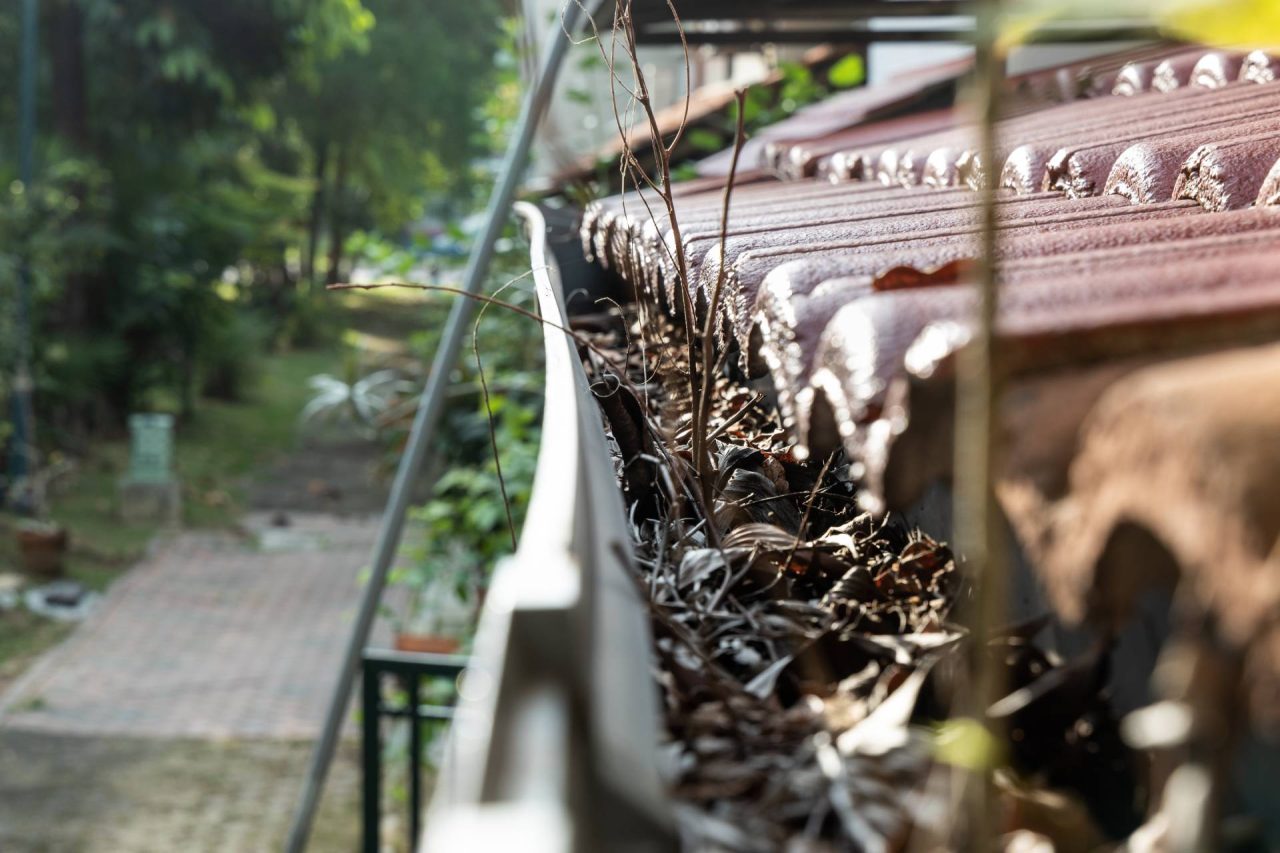Gutters play a crucial role in protecting your home from water damage, but they’re often plagued by clogs caused by leaves and debris. Leaf guards offer an efficient solution, acting as a shield to keep your gutters clear and functional. For homeowners in Southeast Michigan, where seasonal changes bring an abundance of foliage, leaf guards are a game-changer. In this guide, we’ll explore everything you need to know about leaf guards to help you decide if they’re the right choice for your home.
1. What Are Leaf Guards for Gutters?
Leaf guards, also known as gutter guards, are protective covers or inserts designed to prevent leaves, twigs, and other debris from entering your gutters. By keeping debris out, they ensure that rainwater flows freely, reducing the risk of clogs and water damage.
Leaf guards come in various designs and materials, each suited for different needs. Mesh guards, for instance, are great for areas with heavy debris, while foam guards are a quick and affordable solution for smaller homes. Their primary function is to save homeowners the hassle of regular gutter cleaning while protecting the integrity of their gutters and homes. Proper selection and installation are key to maximizing their benefits.
Types of Leaf Guards
- Mesh Guards: These feature a fine mesh that allows water to pass through while blocking debris. They’re highly effective and widely used.
- Reverse Curve Guards: These direct water into the gutter while deflecting leaves and debris over the edge.
- Brush Guards: Resembling bottle brushes, these sit inside the gutter and block large debris while allowing water to flow.
- Foam Guards: Made of porous foam, these fit inside the gutter, letting water through but keeping debris out.
2. What Is the Difference Between Gutter Guards and Leaf Guards?
The terms “leaf guards” and “gutter guards” are often used interchangeably, but they can differ slightly based on functionality.
While gutter guards aim to protect against a wide range of debris, including shingle grit and pine needles, leaf guards focus specifically on preventing leaves from clogging the system. This distinction is particularly important for homeowners in wooded areas where leaves are the primary issue. Understanding your home’s specific challenges can help you choose the right type of guard for optimal performance.
Gutter Guards:
- A broader term encompassing all systems designed to protect gutters from debris, including leaves, pine needles, and even pests.
Leaf Guards:
- These guards specifically focus on blocking leaves and larger debris, making them ideal for regions with heavy foliage.
In essence, all leaf guards are gutter guards, but not all gutter guards are specifically designed for leaves.
3. Do Leaf Guards Need to Be Cleaned?
While leaf guards significantly reduce the need for gutter cleaning, they aren’t completely maintenance-free. Over time, smaller debris like seeds or shingle grit may accumulate on top of the guard or inside the gutter.
Homeowners should still inspect their gutters periodically to ensure optimal performance. Cleaning leaf guards is usually straightforward and requires minimal tools, such as a garden hose or a small brush. Regular maintenance helps extend the life of the guards and ensures your gutters continue to function efficiently, especially during peak seasons like fall.
Maintenance Tips:
- Inspect the guards periodically, especially after heavy storms.
- Use a garden hose to wash away any buildup on the surface.
- For persistent clogs, consult a professional to ensure the guards are functioning correctly.
4. Do Leaf Guards Overflow in Heavy Rain?
Overflow can occur if the leaf guards are not properly installed or if the chosen type isn’t suitable for the region’s rainfall patterns. Heavy rain can overwhelm some systems, especially those with finer mesh or smaller openings.
Choosing the right guard for your area’s climate is essential. For regions like Southeast Michigan that experience heavy rainfalls, high-capacity systems with larger openings or reverse curve designs are recommended. Proper installation, accounting for roof pitch and gutter alignment, also minimizes the risk of overflow.
Preventing Overflow:
- Opt for high-quality guards designed for heavy rain, such as reverse curve or large-mesh systems.
- Ensure proper installation to maintain optimal water flow.
- Consider the slope of your gutters and roof to aid water movement.
5. How Long Do Leaf Guards Last?
The lifespan of leaf guards depends on the material and quality of installation.
Investing in high-quality materials and professional installation pays off in the long run. For example, aluminum and stainless steel guards resist rust and weathering, making them ideal for harsh climates. Regular maintenance and periodic inspections also contribute to their longevity. Understanding the expected lifespan of each type helps homeowners plan for replacements and avoid unexpected expenses.
Expected Durability:
- Plastic Guards: Typically last 3-5 years but may degrade faster under harsh weather conditions.
- Metal Guards: Aluminum and stainless steel options can last 10-20 years with proper care.
- Foam Guards: Tend to have a shorter lifespan, around 3-7 years.
Factors such as weather, maintenance, and professional installation can significantly influence longevity.
6. Who Are Leaf Guards Ideal For?
Leaf guards are an excellent choice for:
Leaf guards are particularly beneficial for homeowners in areas with dense tree coverage or those who experience frequent clogs. They’re also ideal for individuals who want to minimize the time and effort spent on gutter maintenance. In regions like Southeast Michigan, where seasonal debris is abundant, they provide a practical solution to protect gutters year-round.
- Busy Homeowners: Those seeking a low-maintenance solution to gutter cleaning.
- Homes Surrounded by Trees are ideal for properties in wooded areas or regions with heavy foliage, such as Southeast Michigan.
- Climates with Heavy Rainfall: Preventing clogs helps maintain efficient water drainage.
7. Benefits of Installing Leaf Guards
Installing leaf guards comes with several advantages:
Beyond reducing maintenance, leaf guards help protect your home from long-term issues like foundation erosion and basement flooding caused by clogged gutters. They also prevent pests, such as mosquitoes and rodents, from nesting in standing water. With the added benefit of extending the life of your gutter system, leaf guards offer both immediate and long-term value.
- Reduced Maintenance: Minimizes the frequency of gutter cleaning, saving time and effort.
- Prevent Water Damage: Keeps gutters clear to ensure proper water drainage, protecting your home’s foundation and siding.
- Pest Control: Blocks rodents, birds, and insects from nesting in your gutters.
- Increased Gutter Lifespan: Reduces wear and tear caused by clogs and standing water.
8. How to Choose the Best Leaf Guards
Selecting the right leaf guards involves evaluating several factors:
Doing your research and consulting with professionals can save you from costly mistakes. The leaf guard’s material and design should align with your home’s specific needs and local weather conditions. For instance, mesh guards are ideal for fine debris, while reverse-curve designs effectively handle heavy rainfall. Professional installation ensures proper fitting and functionality, giving you peace of mind.
Key Considerations:
- Material: Opt for durable materials like aluminum or stainless steel for longevity.
- Budget: Balance cost with quality; while premium options have a higher upfront cost, they often require less maintenance.
- Compatibility: Ensure the guards fit seamlessly with your existing gutters.
- Installation: Professional installation is recommended for optimal performance, especially for complex systems like reverse curve guards.
DIY installation can be an option for simpler systems, but professional gutter installers help ensures proper alignment and functionality.
Conclusion
Leaf guards are an invaluable investment for homeowners looking to protect their gutters and reduce maintenance efforts. By understanding the different types, maintenance needs, and benefits, you can make an informed decision tailored to your home’s needs.
If you’re considering leaf guards for your home, consult the experts at Horizon Roofing & Construction. With years of experience serving Southeast Michigan, we’re here to help you choose and install the perfect solution for your gutters. Contact us today to schedule a free gutter consultation!

